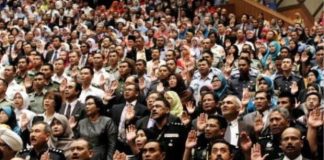The ILO releases new guide to promote gender equality and empower women in the world of work in conflict, disaster and other fragile settings
A virtual panel discussion organized during the 66th session of the Commission on the Status of Women provided the platform for the launch of a new guide designed to strengthen gender equality and women’s empowerment in fragile, conflict and disaster settings. The new publication will guide ILO staff, constituents, and other stakeholders on integrating gender-responsive and conflict-sensitive approaches in initiatives related to employment and decent work across the Humanitarian-Development-Peace Nexus, i.e. the interlinkages between humanitarian, development and peace actions.
The new guide, Gender equality and women’s empowerment in the world of work in fragile, conflict and disaster settings , provides an overview of how fragility, conflicts and disasters affect gender equality in world of work-related areas. It also presents the key global frameworks and contains practical guidance – both general recommendations and technical area-specific guidance on gender mainstreaming in crisis settings.
To enhance the impact of action both in terms of gender equality and peace and resilience, the Guide recommends, among others:
• Recognizing that crises affect women, men, girls, and boys differently, and the importance of gender equality and the empowerment of women and girls in promoting peace, preventing crises, enabling sustainable recovery and building resilience.
• Avoiding stereotypical portraying of women, men, girls, and boys and always taking into consideration that women, as well as men, are not a homogeneous group. Different personal characteristic such as sex, gender, race, ethnicity, caste, sexual orientation, sexual identity, disability, indigenous or tribal belonging and others may intersect resulting in compounded discrimination.
• Supporting positive gender-related changes that may have occurred in the labour market.
• Working with men. Addressing gender inequalities and strengthening women’s empowerment, participation and leadership cannot be done by working with and for women only. Including men and working on gender and patriarchal norms in an inclusive way is critical to achieve positive and sustainable change.
• Leveraging the institutions of work and social dialogue.
• Giving due consideration to the interconnectedness of conflict, environmental degradation and climate change, and gender inequality, and ensuring interventions leverage the mutually reinforcing dynamics of gender, peace, and resilience.
• Working at upstream and downstream levels and considering the needs for both immediate job creation-, income- and livelihoods support and for action to build long-term resilience, sustain peace and bring about transformative change in terms of gender equality.
The Guide also reinforces the strong mandate of the ILO through the Employment and Decent Work for Peace and Resilience Recommendation, 2017 (No. 205) to promote gender equality in the world of work in all types of settings, including those characterized by fragility, disaster, or conflict. Women and girls often suffer the most during conflicts and disasters, including pandemics. Crisis-related hardships combine and compound pre-existing disadvantages; for example, they often cause women’s working conditions to worsen while increasing their overall workload and care responsibilities.
At the same time, crises can give rise to changes that enable women to take up roles that were previously available only to men, and crises can open opportunities to address existing gender-based discrimination and violations of rights. “Women’s empowerment and gender equality in the world of work is more closely interlinked with peace and resilience than one may think”, says Mito Tsukamoto, Chief of the Development and Investment Branch of the ILO Employment Policy Department. “For example, in addition to contributing to sustainable development, programmes that increase women’s employment and decent work opportunities, responding to their immediate and long-term needs, can enhance social justice, cohesion and contact, yielding positive dividends for peace and strengthen women to act as agents of peace”.
Prior to the COVID-19 pandemic, about 1.8 billion people across the world were already living in fragility, and the pandemic has exacerbated the vulnerability of people who were already in the grip of disaster and conflict. “It is important to address gender and intersecting inequalities in crisis settings to make sure that women can participate fully and equally in all processes related to peacebuilding”, says Chidi King, Chief of the ILO Gender, Equality, Diversity and Inclusion Branch (GEDI). “This guide supports this aim and supplements existing ILO resources in the area of gender equality as well as disaster and conflict”.
The guide was developed by the ILO Coordination Support Unit for Peace and Resilience (CSPR) in the Development and Investment (DEVINVEST) Branch, in collaboration with the Gender, Equality, Diversity and Inclusion Branch (GEDI) and will be available in English, French and Spanish.




















